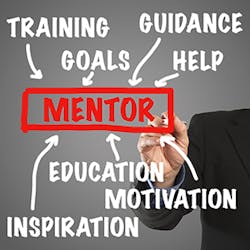My typical work day includes heartfelt conversations with both successful and wanting-to-be-more-successful HVAC professionals. As I prepared to write this article over the last few weeks, I recognized the culture of constant mentoring was alive and well in each successful company I spoke with. Let’s look at how mentoring can build stronger and more successful HVAC careers and companies.
What’s a Mentor?
A mentor can be defined as an experienced and trusted person who offers another person knowledge, encouragement, and support over a period of time.
A more valuable definition would be to identify a person in your own life who shared with you their knowledge, encouragement, and support to improve who you are and how you do what you do. If you have been fortunate to have had a mentor in your life, you already understand the immense value such a person offers.
How Can I Mentor?
One of the best mentors I know is Tony Doyle (who used to work for NCI). When Tony perceives a need, answers a difficult question, or sends his wisdom in my direction, I have often wondered how he does it. So I asked him. “I pay attention” is his simple answer.
Mentors pay attention. Their drive is a desire to help others. To discover the opportunity to mentor, you must carefully pay attention to what’s happening around you and look for opportunities to share your knowledge and encouragement with others who may be able to use what you can offer.
Mentoring is a fluid activity -- it can be planned and scheduled, but most often it is an impromptu reaction to an immediate need. It often happens spontaneously. We have all heard the saying “When the student is prepared, the master appears.”
Should you choose to strap on the mantle of a mentor, you are in for a delightful adventure. There is no website to get you signed up, no credential to secure, no one to call to get permission. You just chose to add this virtue to your life. Pretty cool, right? Is this opportunity calling your name? If so, I invite you to jump right in.
Our company, NCI, is primarily in the training business. Next week, 15 of the best trainers in our industry gather together for our annual meeting here in Ohio. One of the primary qualifications I look for in an instructor is a mentoring heart. Each one of these guys has mastered the ability to mentor and has this gift as an essential element of their character.
So How Do You Get Started?
By paying attention to the needs of those around you, you begin to discover people who can benefit from your knowledge and experience.
Activities that qualify you as a mentor include:
• Build and strengthen relationships. The relationship between two people engaged in mentoring is a very personal one. This principle identifies the difference between telling a guy what to do and being in a mentoring relationship.
• Offer knowledge and support to those you wish to mentor and pay special attention to the willingness of your protégé. Willingness can come and go throughout a day; you’ll learn quickly when it is a good time to mentor and when it may need to wait.
• Constantly feed your personal knowledge and skills so you actually have more experience and understanding to draw from. How can you inspire and teach without possessing the knowledge yourself?
• Learn with the desire to teach. Being a teacher, I gather knowledge daily for you guys, as well as myself. Learning to teach others multiplies your ability to retain knowledge and skills.
• Encourage two-way mentoring. Your protégé may consider you the Jedi, and themselves as a Padawan learner. But I have been fortunate to learn as much from those I mentor as I have taught.
• As the Boy Scout Motto says, “Be Prepared.” Mentoring requires thinking on your feet, being able to read and respond to a developing situation, and fitting your instruction to the circumstances at hand.
Are you beginning to see that effective mentoring requires a certain way of looking at the world? It also means you need to assume a role of willing service when the opportunity presents itself.
Mentoring no-nos:
• Forced-learning is certainly not mentoring. Graciousness and encouragement are required mentoring virtues. The spirit of mentoring is freely given and happily received. Be sure to keep that intent in the relationship to maintain open-mindedness.
• As the saying goes, Praise in public, discipline in private. Because mentoring sometimes includes correction, be sure not to correct your protégé in front of others to protect against embarrassment.
• Never betray confidences. Trust is the foundation of a mentoring relationship. Protect that relationship by assuring weaknesses discovered in the mentoring process remain confidential, where appropriate.
• Straying outside of boundaries. You may be the Jedi at diagnosing the air-side of an HVAC system, but may not be qualified to provide advice on raising your protégé’s kids. Stick to what you’re good at and don’t be afraid to steer clear of subjects you’re not qualified to address.
Learning how to mentor those around you is a life skill that takes effort and work to effectively develop. There are a number of valuable books and organizations dedicated to the development of this skillset.
Over a Period of Time
Ideally mentoring can be sustained over an extended period of time. This is very possible if your protégé happens to work in the same place as you or is connected through an organization or relationship where there is constant contact.
However, mentoring can also be a spontaneous one-time contribution to the life of another. Again, being prepared, thinking on your feet, and living in a way that you are open to giving and receiving mentoring brings richness and fulfilling experiences to life.
Once a true mentoring relationship begins, it can easily be maintained over the years. The value of that contribution to the life of another can be immeasurable. Mentoring fosters communication of a higher level than everyday conversations. All conversations are not of equal value. Some words shared at the right moment can be carried with you and change your life.
Best of luck to you as you seek to add this virtue to your relationships.
Rob “Doc” Falke serves the industry as president of National Comfort Institute, an HVAC-based training company and membership organization. You can contact Doc at [email protected] or call him at 800-633-7058. Go to NCI’s website at nationalcomfortinstitute.com for free information, articles, and downloads.










